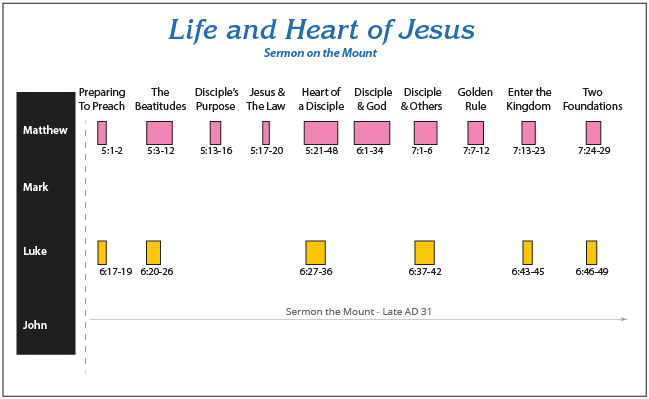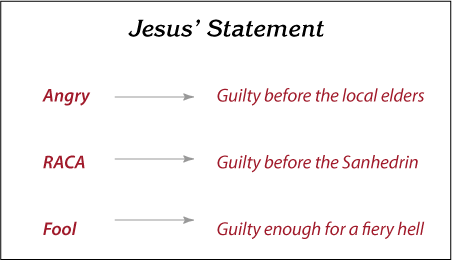About one year ago I was involved in a meeting with a group of people who were the leaders of a secular organization. About half way through the meeting, several individuals began to ask for some changes to occur. Their requests were simple but near the end of the conversation, one of members of this organization exploded in anger at another member. I was stunned at his reaction, but I was even more surprised when his victim responded by calling him names. In response the “attacker” called the victim “worse” names and then sat pouting like a child. It was a sad affair.
Anger in the heart does not always explode and result in insults as in the situation I experienced. Anger can reveal itself in many different ways and to different degrees. For example, many people who are angry may simply withdraw from others and want to be alone. This is a wise response when attacked. It allows a person to cool down before responding. But sometimes people withdraw in anger and never want to meet or speak with the “attacker.” Proverbs warns us to not do this,
He who separates himself seeks his own desire, he quarrels against all sound wisdom. Proverbs 18:1 (NASB)
Sometimes anger results in gossip. Gossip is an attack on another person behind his/her back. If anger is not dealt with over a long period of time, it may result in martyr complexes, rebellion, constant nagging, complaining, or some other reaction. Anger has many faces and its disguises can be subtle. How do we deal with anger? What is this emotion we call anger?
Background
The answers to these questions will come from the lips of Jesus in this study in the Sermon on the Mount. Our study follows immediately after Jesus’ warning in Matthew 5:17-19 about the false teaching of the religious leaders of His day. While Matthew 5:17-19told us that the Word of God will not change or disappear before heaven and earth are destroyed, Jesus also told us that He had come to speak the truth. He had come to fulfill the prophecies about Himself and to correct the false teachings of the scribes and Pharisees. Jesus fulfilled the scriptures in at least two ways.
Another Warning
When we come to this study in Matthew 5:20-26, we find Jesus giving His listeners another warning about these same religious leaders.
For I say to you that unless your righteousness surpasses that of the scribes and Pharisees, you will not enter the kingdom of heaven. Matthew 5:20 (NASB)
Jesus’ message was clear. Unless their righteousness “surpasses” that of their religious leaders, they were not going to make it into heaven. The Greek word that Jesus used for “surpasses” is perisseuo. It means “to have abundance,” “to lavish,” to surpass, or “to make over-rich.” Maybe the best five word definition is “more, more, more, more, and more.” If we reword Jesus’ statement, we have “Unless your righteousness is more, more, more and more than that of the scribes and Pharisees, you are not going to enter the Kingdom of Heaven.” This must have been a shocking statement to His Jewish listeners because there was a Jewish saying that, “If only two people go to heaven, one will be a scribe and the other will be a Pharisee.” That statement indicates that the people highly respected their religious leaders as being very holy men. How do you regard your religious leaders?
In our last study Jesus had warned His listeners that their religious leaders taught error, and now He warns them not to follow the spiritual example of their leaders. They were warned about what they said and how they lived. Now there was nothing left to respect or to follow.

Many today highly respect their religious leaders as very spiritual or holy men. Have you ever said to yourself, “I would like to be like him?” Have you ever thought that some religious leader was closer to God than you were? Be warned. They may not be what they seem to be. They may be teaching error and their lives may not please God. God may have rejected them just as Jesus did when He walked this earth. What God expects from us is found in the Bible.
What God wants may not be accurately written or provided in a church bulletin, recorded on a DVD, printed in a Christian book, spoken from a pulpit, modeled in the life of a religious leader, or sung in a praise song. God’s Word is the only source of truth. Everything else may contain human error. Jesus says that even religious leaders can be wrong! Do you know the Bible, or do you know only what some author, teacher, leader, or preacher told you that the Bible says? Be warned. They may be wrong! The Pharisees and scribes were wrong. Their teaching and their spiritual lives were a mess.
You Have Heard
Then Jesus proceeded to correct several false teachings and to give His listeners a different standard of spiritual conduct.
You have heard that the ancients were told, “YOU SHALL NOT COMMIT MURDER” and “Whoever commits murder shall be liable to the court.” Matthew 5:21 (NASB)
Jesus starts by quoting the sixth command in the Ten Commandments which were recorded by Moses in Exodus 20:13 and Deuteronomy 35:30-31. Then Jesus apparently repeats a common statement used among the people.
Some have accused the Pharisees of adding “Whoever commits murder shall be liable to the court” to the commandment and believe that the religious leaders had removed the penalty of capital punishment. But if we look closely at the following passage, we discover that God required a court trial for anyone accused of murder.
Then the LORD spoke to Moses, saying, “Speak to the sons of Israel and say to them, ‘When you cross the Jordan into the land of Canaan, then you shall select for yourselves cities to be your cities of refuge, that the manslayer who has killed any person unintentionally may flee there. The cities shall be to you as a refuge from the avenger, so that the manslayer will not die until he stands before the congregation for trial.'” Numbers 35:9-12 (NASB)
Then in Numbers 35:30 we discover that God required at least two witnesses to appear at the trial.
If anyone kills a person, the murderer shall be put to death at the evidence of witnesses, but no person shall be put to death on the testimony of one witness. Numbers 35:30 (NASB)
In Deuteronomy 17:8-13 we find that God also required courts, judges, and a verdict. By comparing Deuteronomy 17:8-13 and 19:11 we further discover that there were two levels of courts. The elders of a city could make the legal decision, or a court called the Sanhedrin could consider more difficult cases.
God had established a legal system in the Mosaic Law. The system would protect the rights of a man or woman who was accused of murder or some other crime. So after Jesus quoted the sixth commandment, “You shall not murder,” He added that they would have to go to the court for a trial. This was all true.
The Heart
But a person did not go to trial because they were accused of being angry, insulting someone, calling some names, threatening a person, or hitting a person. God had never required that. A person went to court only when they were accused of murder. But Jesus wanted to teach them that God cared about the attitudes of their hearts as well as their external conduct. The religious leaders were emphasizing their external behavior, so He added the following,

But I tell you that anyone who is angry with his brother will be subject to judgment. Again, anyone who says to his brother, “Raca,” is answerable to the Sanhedrin. But anyone who says, “You fool” will be in danger of the fire of hell. Matthew 5:22 (NIV)
The literal Greek of the passage reads as “I, I say.” That is, Jesus repeated the word “I.” He emphasized that He was speaking. He was claiming authority. We can rephrase His statement this way, “But I tell you that the truth is” that anyone who is angry or insults someone will go to court and stand trial. Jesus ignored any comment about “murder.” The court that Jesus referred to appears to be the local city court of the elders. If so, then Jesus was saying that a person who was angry would be guilty before the court of the local elders.
Then Jesus said that if you call someone “RACA,” which refers to another’s lack of intelligence, then you will stand before the Sanhedrin. The Sanhedrin was the highest Jewish court in Israel and it was composed of seventy judges. Each man was a religious leader. The word “RACA” reminds me of the actor called “Curly” in the old comedy series called the “The Three Stooges.” In one of the Larry, Moe, and Curly episodes, “Curly” is having a difficult time and says, “I am trying to think but nothing happens.” If someone else had said that of Curly, it would be a great illustration of RACA. “Trying to think but nothing happens.” What an insult it would have been to call someone RACA.
Jesus’ next statement is about another name calling offense. Jesus says that if someone calls another person a “fool,” that person will be in danger of going to “hell.” The Greek word that Jesus uses here is moros. The word implied that a person’s character was horrible. It is one thing to insult someone, but it is worse to slander one’s character.
The Greek word that Jesus used for “hell” is gehenna. Gehenna was located in the Valley of Hinnom. Historical evidence indicates Gehenna was a place where dead bodies were buried, the ancient worship to Moloch had occurred, and where the city’s trash was burned. It was now a trash dump. The fires reportedly burned all of the time, and it was therefore a picture of hell for the Jews. As a result, Gehenna was the common name they used to refer to “hell.”
What was Jesus’ message? His message was simple. God is not just concerned about the external. He is concerned about our inside too! He is not concerned only about our outward conduct. He is more concerned about our attitude on the inside. There is an old story about a little boy who had been ordered by his mother to sit down. He did not want to obey, so he told his mother that he would sit down on the outside but he would be standing up on the inside! Jesus’ message was that God is more concerned about our standing up on the inside. God wants us to sit down on the inside too! When we sit down on the inside, we will also sit down on the outside. Anger is the root evil that leads to hate and then to murder. Hatred is a sin (Leviticus 19:17).
First Mystery
Then Jesus makes two very surprising and misunderstood statements. The first one is about leaving an offering at the altar in order to make peace with someone you have offended.
Therefore if you are presenting your offering at the altar, and there remember that your brother has something against you, leave your offering there before the altar and go; first be reconciled to your brother, and then come and present your offering. Matthew 5:23-24 (NASB)
In Jesus’ day the Jews would bring sacrifices to the temple as an act of worship, and their sacrifices would be placed on the altar for their sins. Just imagine someone coming to the priest at the temple with an animal to be sacrificed only to remember at the last moment that someone was angry or hostile towards him. If he/she decided to obey Jesus, he/she would have to leave the temple and attempt to make peace with that person. That would have been embarrassing and inconvenient to leave.

Today we do not offer sacrifices at an altar when we worship, but the rest of Jesus’ illustration still applies. If you are a Christian and if while you are in church, you remember that someone has something against you, God wants you to leave and attempt to make peace with that person. This includes any church service, Bible study, or any ministry in which you are involved. God does not want us to return until we have attempted to make peace with that person. Now peace may not be possible, but no one knows until they have tried. Romans 12 reminds us that we must try,
If possible, so far as it depends on you, be at peace with all men. Romans 12:18 (NASB)
God is not asking us to seek peace with some false teacher or someone who was in sin that we have had to rebuke. Those individuals might be angry with us even after we lovingly and graciously warn them. God is not asking us to seek peace unless we were unkind or wrong towards another. If someone is angry with us, we need to ask ourselves, “Why?”
Many people use this passage of scripture to justify confronting another person who has offended them. But this passage is not about confrontation or our own personal offense. This passage is about appealing to another person for forgiveness. The passage is about seeking forgiveness from another person whom we have offended or wronged. This passage is about our apology!
Second Mystery
Jesus’ next illustration is another surprise.
Settle matters quickly with your adversary who is taking you to court. Do it while you are still with him on the way, or he may hand you over to the judge, and the judge may hand you over to the officer, and you may be thrown into prison. I tell you the truth, you will not get out until you have paid the last penny. Matthew 5:25-26 (NASB)
This one is about someone who has a legal issue with you or me. Jesus encourages us to go and attempt to seek peace and satisfy the complaint. Anyone who is a landlord and has a tenant who does not pay his rent understands this illustration. The tenant also understands it. The landlord will be angry if he has to evict that person. Jesus is telling the tenant to go and pay.
Jesus’ Point
What was the purpose of the two illustrations, and how do they fit with Jesus’ first statement about anger? At first they might seem to not fit together, but they do. Why would Jesus tell us to go and make peace with someone who has something against us? The answer is that God is concerned about your anger and the anger of the one whom you offended. He is concerned about the anger of everyone.
When someone is angry with us, he or she is often angry for a good reason. Usually we have done something to offend him or her. But this is not always the case. There are people who are always angry. There are people who want to control us, and if we do not submit, they become hostile toward us. Our opening illustration is a great example. But many times we need to apologize and seek the forgiveness of the one who was offended.
People can be angry with us because we have sinned against them in some way. So leaving the worship service to seek peace is a time to confess our sin to God first and then to the offended person. Jesus has given us spiritually healthy advice. It leads to righteousness and health.
Conclusion
How can we deal with our own personal anger towards another? Here are some biblical steps to follow:
1. Admit to yourself that you angry – This may be difficult for some people due to pride or because they do not recognize that they are angry.
2. Repent of Your Sins – You must want God’s forgiveness. There must be a repentant attitude inside if you want God to forgive you. That is, you must desire not to repeat that sin.
3. Confess Your Anger To God – This is the major step. Admit that you are angry to God and then thank Him for forgiving you. God has promised to forgive you and to cleanse all of your unknown sins (1 John 1:9).
4. Ask For Protection – We should ask God to protect us against Satan and his evil forces. Eph. 6:12 warns us that we do not struggle simply against flesh and blood. We struggle against evil forces.
5. Seek Peace With Others – Finally, we need to seek peace with any whom we have offended. We need to apologize and own our sin.
But sometimes we have unknowingly offended another person. Such events do occur and they cannot always be helped. Yet, we should seek his/her forgiveness too! Jesus wants us to be open with others and to keep our spiritual slates clean. God calls us to be peacemakers and not troublemakers. God has called us to help others and not hurt others. Is someone angry with you? Go and seek peace!
Here are a few verses to remember as we close.
An angry man stirs up strife . . . Proverbs 29:22 (NASB)
. . . a sly tongue brings angry looks. Proverbs 25:23 (NIV)
Do not associate with a man given to anger; or go with a hot-tempered man, or you will learn his ways and find a snare for yourself. Proverbs 22:24-25 (NASB)
A man’s wisdom gives him patience; it is to his glory to overlook an offense. Proverbs 19:11 (NIV)
A fool shows his annoyance at once, but a prudent man overlooks an insult. Proverbs 12:16 (NIV)
A gentle answer turns away wrath, but a harsh word stirs up anger. Proverbs 15:1 (NIV)